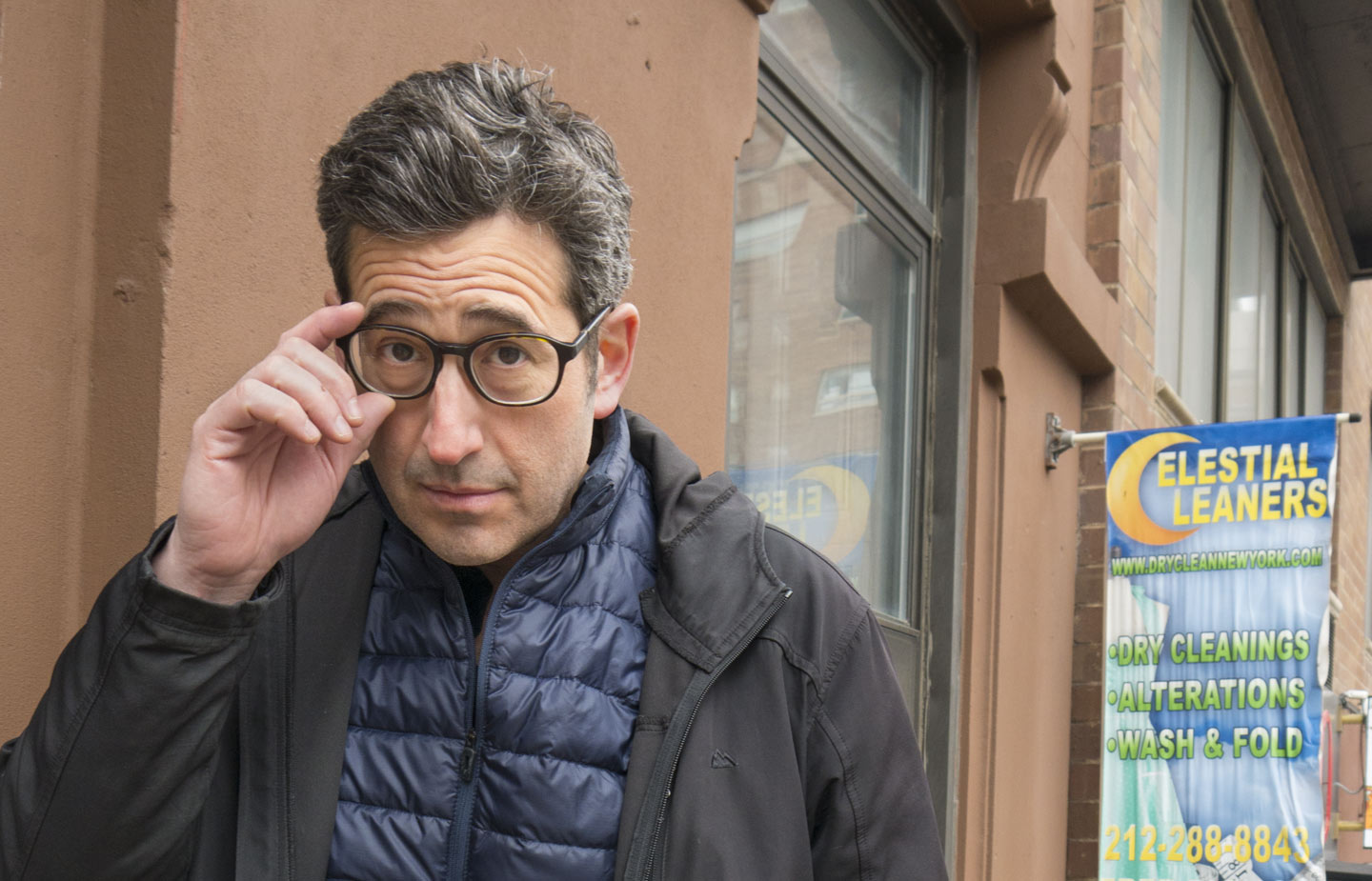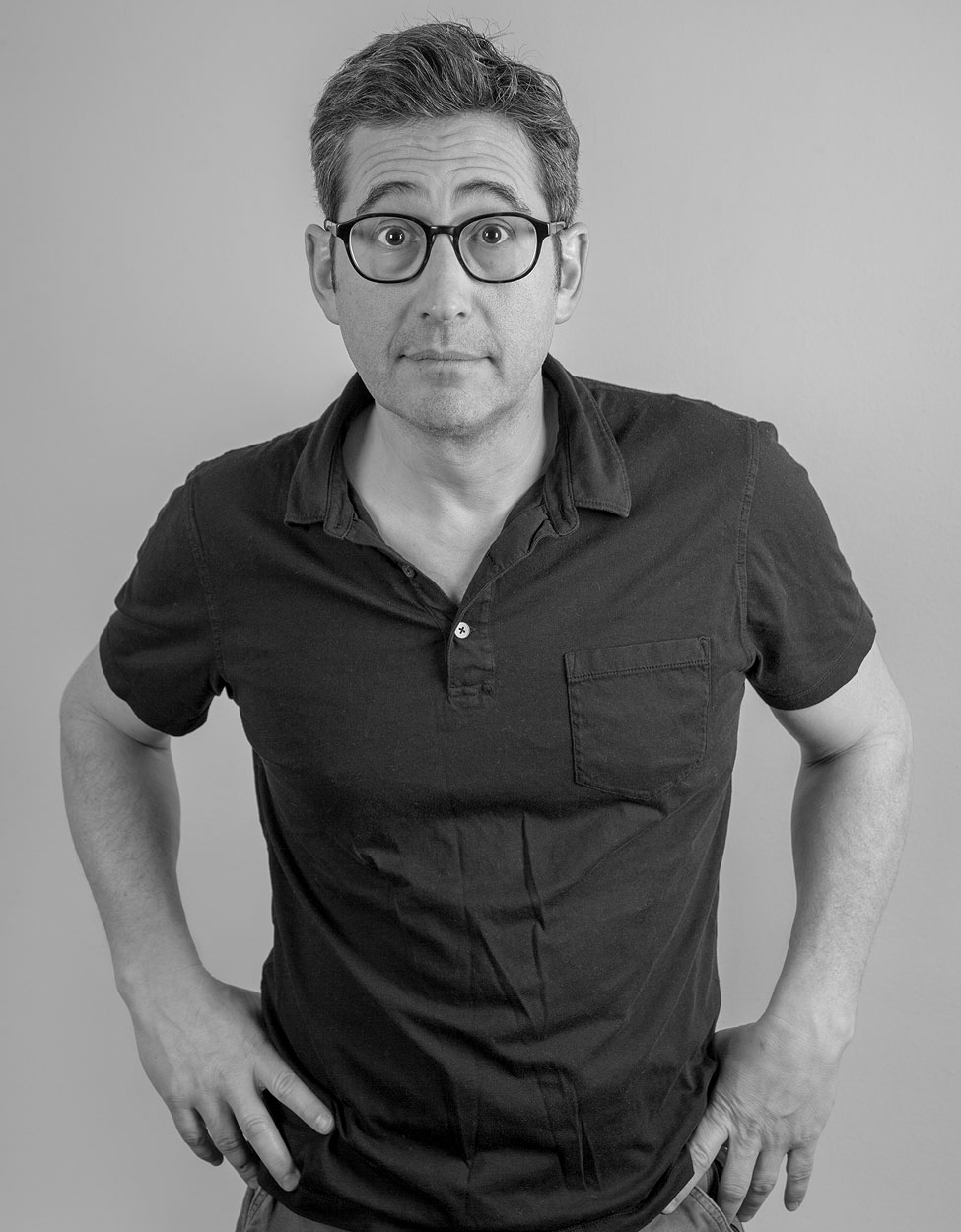The Majority Report
Sam Seder ’88 went from stand-up comedy to hosting a political podcast and working as an MSNBC contributor. But is there anything funny about the current state of politics?
When Sam Seder ’88 told his parents that he planned to drop out of law school to become a comedian, they didn’t laugh.
After graduating from Conn with a degree in government, Seder spent a year traveling in Australia only to succumb to the great magnet of the family business (his father is a prominent attorney) and return to his native Massachusetts to enroll in Boston University School of Law.
Far more passionate about comedy than the law, Seder left BU and began performing stand-up in small clubs throughout the Boston area. Because of Seder’s quirky material, he was welcomed by a group of young Boston comedians, some of whom, as luck would have it, turned out to be the most innovative and influential stand-up figures of their generation.
Seder’s new comedic friends included the now two-time Emmy Award-winner Sarah Silverman, David Cross (Arrested Development), actress Janeane Garofalo, and Seder’s fellow Conn alum, the prolific comedian and voice actor H. Jon Benjamin ’88 (Next Stop Wonderland and Archer).
“I got lucky in comedy, in that I happened to be at the right place at the right time,” Seder said.
Harnessing their creative chemistry, Seder assembled them for his first film, Who’s the Caboose, a documentary-style spoof of the Hollywood auditioning process that he co-wrote, directed and acted in. The movie developed a cult following, if not widespread commercial release, and caught the eye of entertainment executives, which led to appearances on Spin City and Sex and the City. Seder then found himself up for the part of Courtney Thorne-Smith’s brother on the pilot According to Jim, but it didn’t especially appeal to Seder.
According to The Boston Globe, Seder sabotaged his opportunity to land the part as the former Melrose Place star’s brother, and in an interview with the newspaper, he joked, “‘I don’t look anything like Courtney Thorne-Smith; she’s blonde and good-looking,’ says Seder, who’s Jewish and has dark curly hair.”
“I did my character in a Jackie Mason voice, and put ‘If I Were a Rich Man’ as my ringtone, and got all my friends to call me on the set.”
Needless to say, he wasn’t picked to be on According to Jim, which later became a massive hit.
Seder’s early comedy wasn’t driven by politics, but after the 9/11 attacks he became more politically vocal, making him the perfect co-host for his old friend Garofalo’s radio show on the newly launched progressive radio station Air America.
Seder quickly became one of the most popular talents on Air America, known for his wit, intellect, unrivaled preparedness and ability to humorously highlight the relentless flow of absurdities, large and small, in American politics. While establishing his own radio program and podcast, “The
Majority Report,” he also became an effective TV personality, regularly appearing as a commentator and recurring guest host on MSNBC’s prime-time show Countdown with Keith Olbermann. It was a role that at times, Seder joked, upset
his stomach.
“I was filling in for Keith Olbermann back in 2010; I was very nervous and I got indigestion and thought that I was having a heart attack,” he recalls.
“I remember thinking, ‘This is going to be great for YouTube if I actually have the heart attack on air. It’ll go viral.’”
CC Magazine: How does it make you feel to see other Conn alums in the political world, like Josh Green and Sean Spicer?
Sam Seder: Broadly speaking it’s great. Spicer isn’t necessarily the ambassador I would have chosen. I think Josh’s work is great. I’ve also read at least one of David Grann’s books.
CC Mag: Initially, you teamed up with H. Jon Benjamin. Did you meet him at Conn?
Sam Seder: I actually knew him from growing up in Worcester. We were never friends. We were enemies. Out of sheer coincidence we lived across the hall from each other at Conn. I think we both felt a little bit alienated at first and bonded because of that. But then a year or two after college we moved in together in Cambridge and we started doing comedy.
CC Mag: How are you able to do so many things? You’re an actor, writer, producer and director.
Sam Seder: I never got really good at one of them. I feel like I’m talented at some things, but I got super lucky. I got in with David Cross and a bunch of talented comedians that I met through him.
CC Mag: How did you meet these comedians?
Sam Seder: I was doing stand-up at Catch a Rising Star, a famous comedy club in Boston. Jon Benjamin and I were writing stuff and performing, and Cross and his comedy group liked what we were doing. That’s how I met Marc Maron, Sarah Silverman, Louis C.K. and all those comedians who would come through Catch a Rising Star.
CC Mag: What was your first sitcom audition like?
Sam Seder: I was incredibly lucky in that I got the first job I auditioned for. It was for All-American Girl, the Margaret Cho sitcom. Once you have that first break everything else comes a little bit easier. I was also the flavor of the day as an actor for a while when NBC’s lineup included people like Seinfeld and Sarah Silverman. Then I decided to parlay that acting stuff into writing and directing.
CC Mag: Is there one trait or skill that helped you to be successful on all these platforms?
Sam Seder: I work really hard, and that helps. Even what I do now [“The Majority Report” and contributing to MSNBC] is basically storytelling. I have a pretty good sense with how what I’m saying or communicating lands with people.
CC Mag: Culturally there has been a shift in how people consume the news. Do you have any thoughts on how that evolved?
Sam Seder: Obviously, all the advances in technology have changed how we consume the news. But what is most interesting to me in terms of politics is the function of social media. It’s overused, but the ability to reach a mass audience has been democratized.
CC Mag: And would you say that makes social media good or bad?
Sam Seder: I would say both. I think there are problems with it, and I think there are advantages to it. People were having the same conversation about the phone at one point. I think that there is value in giving everybody an opportunity to basically hold society and different actors to account. But I think it’s going to take a while before we build the social structures to deal with this stuff.
CC Mag: What can be done about the spread of misinformation online, especially from foreign powers like Russia?
Sam Seder: I would argue that far more misinformation comes from the conservative media than the Russians. I think that we have no idea what to do about it and it’s going to get much, much worse because the technology is now out there to create fake audio and fake video. The problem that we have is there are no institutions that people agree are reliable enough to be arbiters. For lack of a better example, without a Walter Cronkite there are no institutions that people broadly subscribe to as being legitimate anymore, and perhaps that’s with good reason.
CC Mag: How do you respond to someone who describes your work as fake news when it’s not?
Sam Seder: You substantiate it. I don’t consider myself a newsperson. I consider myself a political journalist. So I make arguments about politics and I present material that has for the most part been reported out by other people. I think I try over time to vet these people by measuring the validity of their reporting, and my credibility with my audience is a function of my ability to vet reporting.
CC Mag: You mentioned the conservative media. Does conservative talk radio have too much pull?
Sam Seder: I think radio is the perfect medium for reaching the conservative demographic. If you look at the counties that Donald Trump, Mitt Romney and John McCain won versus the Democrats, they’re much sparser, and radio is a great medium for wide-open spaces where people are driving in their cars or where you don’t see as much television. It is a great medium for rural and suburban life. And so it tends to reach their audience. Their project is to talk about what people are ignorant about and tell them that they should remain ignorant about it and they should also be fearful about it.
CC Mag: What role do you think comedy plays when covering President Trump?
Sam Seder: In some respects, he is so ham-fisted that you really need to do something sophisticated. There aren’t a lot of onion layers to peel with Donald Trump. The best Trump comedy I’ve seen was Anthony Atamanuik on The President Show because he really dug into the darkness that must lie inside of Donald Trump. I’ve always integrated, if not comedy, then at least humor and dark humor and satire into my politics, because it’s an effective way to communicate.
CC Mag: How have political satirists like you or Jon Stewart changed the way the mainstream media reports on politics?
Sam Seder: I can tell you in 2004 when Janeane Garofalo and I started Air America, people in the comedy community thought we were nuts. Broadly speaking, none of the comedians that you are aware of were doing political comedy back then.
CC Mag: What changed that?
Sam Seder: I think maybe social media exposed people to politics more.
CC Mag: What are some of the dangers of using comedy to comment on social and cultural issues?
Sam Seder: I don’t know if you are aware of the attempt by Mike Cernovich to get me fired from MSNBC. [MSNBC temporarily severed ties with Seder back in December after the right-wing conspiracy theorist Mike Cernovich misled the network into believing Seder had written an offensive tweet in 2009 by taking it out of context. MSNBC later admitted they had rushed to judgment, and rehired Seder.] I guess theoretically the dangers are that people can misinterpret what you’re saying, or that you can confuse social media with sitting around a table with some of your close friends. I don’t think anybody misconstrued what I wrote in that particular case. I think they deliberately misrepresented it.
CC Mag: Cernovich seemed to be engaged in a smear campaign against you. What was it like when you became
the story?
Sam Seder: It was bizarre. I woke up one of those mornings and I was looking at my Twitter feed and so many people were talking about the story. That was very strange. It was also exciting in some ways. I learned a lot in that week.

